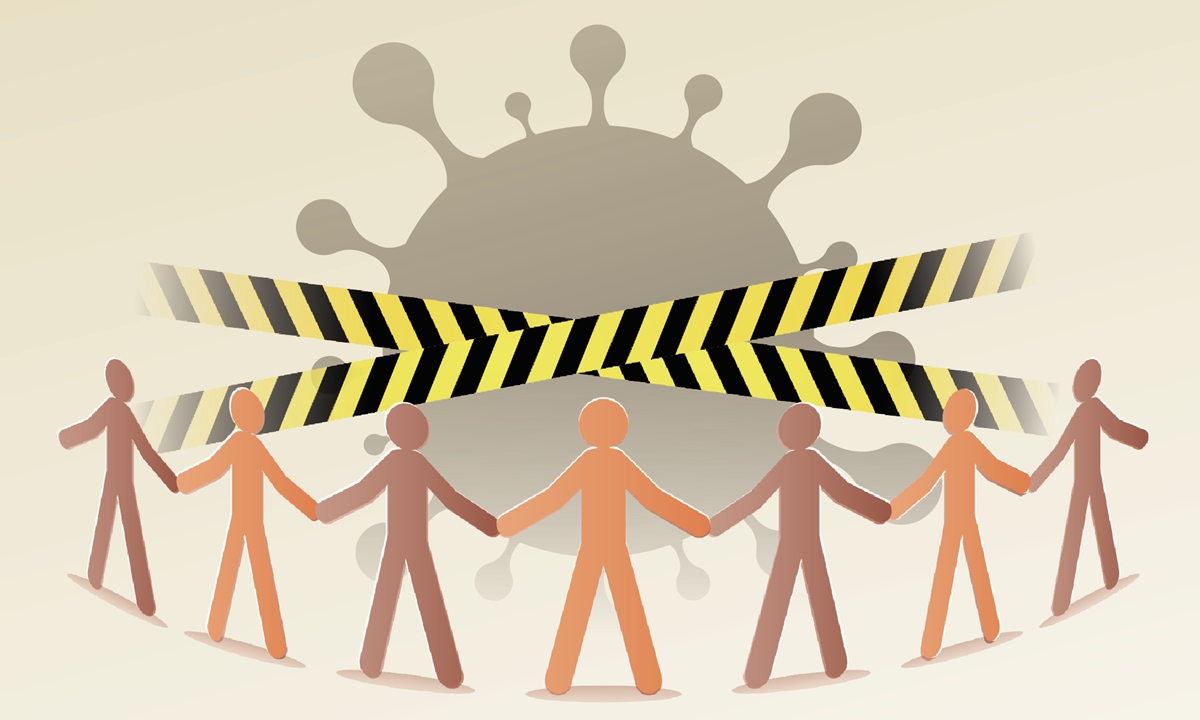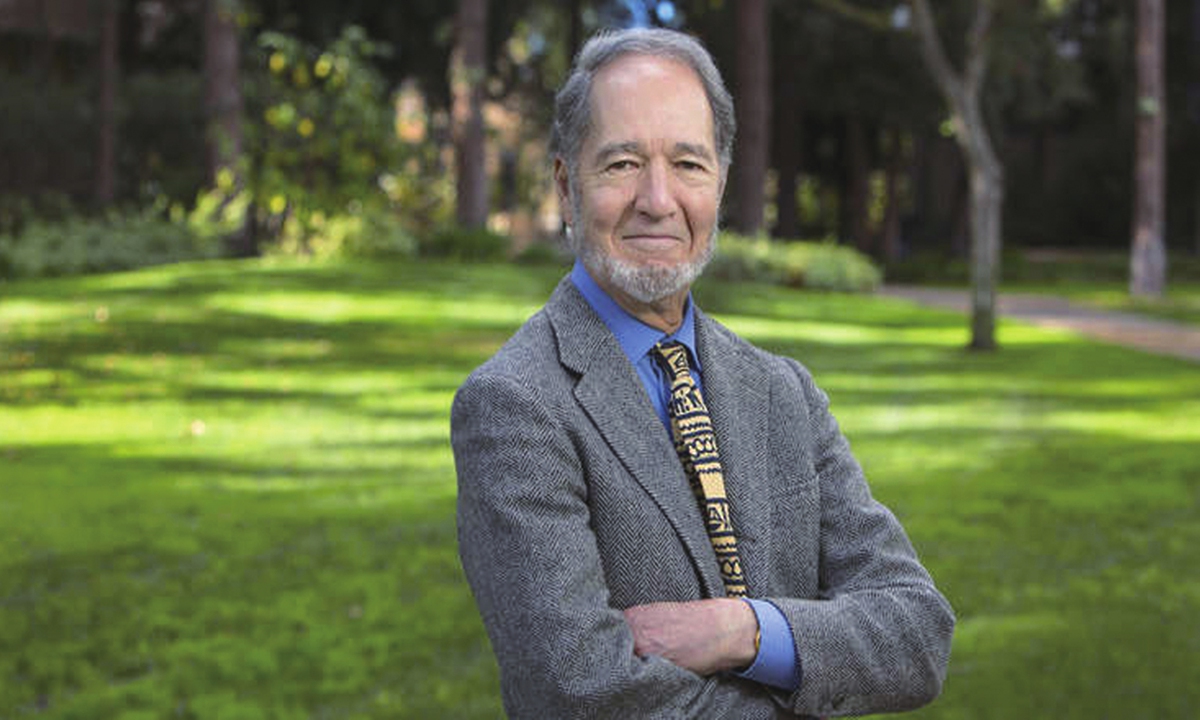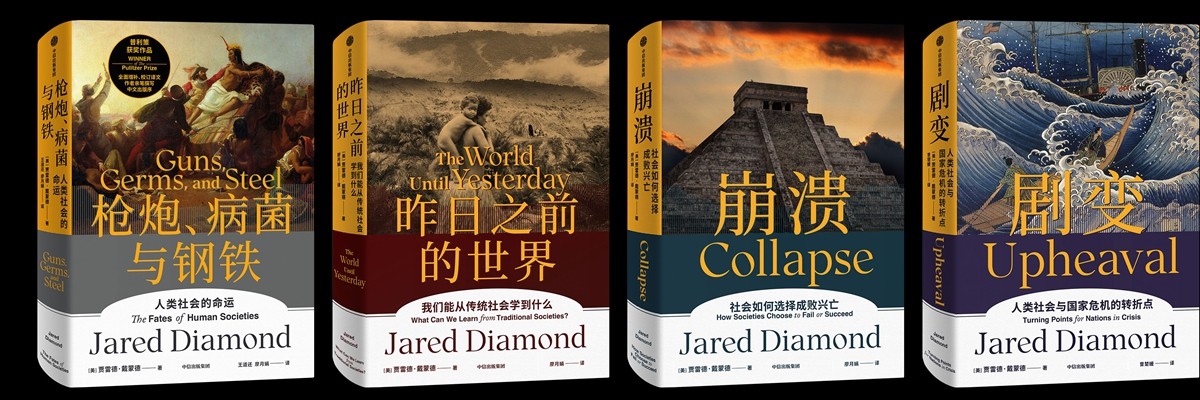Rich and poor countries have to work together to solve the COVID problem: US professor

Photo: VCG
Editor's Note:
How we understand the past may shape our future. Guns, Germs, and Steel, a book that has remained popular for many years, written by Jared Diamond, professor of geography at the University of California, Los Angeles, provides a unique perspective in understanding the human past, especially against the backdrop of the pandemic. "COVID has changed, and I hope that it will change, even more, the political landscape of the world," Diamond said. What makes him think so? How does he think the pandemic is likely to end? Diamond shared his views with Global Times (GT) reporters Li Aixin and Bai Yunyi. The new Chinese edition of the book has been published by CITIC (China International Trust Investment Corporation) Press in January.
GT: After your book was published, did you receive any feedback from Chinese readers that differed from responses from other countries?
Diamond: It's a great pleasure for me to be with you and have this connection with China, even though it's an indirect connection. I'm sitting here in my house in Los Angeles near my university, the University of California.
I've seen the growing interest, not just in China, but in (China's) neighboring countries, Japan and (South) Korea. And I think this has to do with a growing interest in geography, and in the role of geography. China is such a large country that in the middle of China, other countries are distant. But I think interest is growing in China, as well as in your neighbors, in the importance of China's relations with the rest of the world.
Let me give you some examples. Why is it that China has been unified under an emperor for more than 2,000 years, while Europe has never been unified? That's a big question of geography.
Or another question: You have this neighboring big island, Japan. Europe has this neighboring big island, Britain. You might think that Japan and Britain would have similar relationships to China and to Europe respectively. But in Japan, people speak a language that is quite different from Chinese. Whereas in England, people speak a language that is closely related to languages of Europe. Why these big differences between the relation of China with Japan and the relation of Europe with England?
Or another example. Why is it that Chinese people have black hair and black eyes, whereas northern European people have blonde hair and blue eyes. What good does black hair do you in China? And what good does blonde hair do you in northern Europe?
Then still a final example of the importance of geography, the people of Polynesia, islands of the Pacific, the Polynesian islands, such as Tonga, with a volcano that exploded recently. Those Polynesian islands are thousands of miles, maybe 10,000 kilometers from China. But nevertheless, Polynesian people have genes from the Southern China coast. Why are Polynesians so similar to south Chinese? I think those are questions that increasingly interest people in China. These are questions of geography, which are also the questions of my book, Guns, Germs, and Steel.

Jared Diamond Photo: Courtesy of Diamond
GT: You noted at the beginning of the book that it sets out to answer the question: Why did history unfold differently on different continents? And you delivered the answer: Geographic factors matter, rather than people. However, you do not agree with geographical determinism. Would you elaborate on that?
Diamond: Certainly. I've talked about geographic factors, but I've never said that people don't matter. People certainly do matter, but geographic factors and factors of individual people matter in different ways.
I could summarize the differences between the role of geography and the role of individual people by saying that geography has dominating effects over long times and large scales, whereas the acts of individual people have effects over short times on small scales. Why did writing and metal tools and emperors arise first in China and not in Japan and not in Vietnam and not in Mongolia? That's because of geography. There was no individual person, no individual Japanese or Vietnamese or Mongolian person who could have caused writing and metal tools and emperors to rise first outside of China. They rose first in China because of geographic factors.
GT: Since the first publication of the book, are there any viewpoints or analyses made that you may want to adjust now? Or is there anything new you want to convey to Chinese readers through this new edition?
Diamond: My answer to those two questions will be "No to the first one, and Yes to the second one."
Is there anything major that I would change in my book, Guns, Germs, and Steel? No. But there are questions about China, to which we don't have the answers. And for which scientists are seeking the answers.
For example, the inside surface of your upper front teeth. When I feel the inside surface of my upper front teeth, they bulge out. North Chinese people, if you feel the inside of your teeth, they don't bulge out, they recede, like a hollow shovel. In South China, teeth bulge out like my teeth. Why do North Chinese people and South Chinese people have different teeth? I don't know. That's an interesting question that scientists are trying to understand. And someday in the near future, I hope we will get the answer to that. So I would not change the big interpretations of my book, but we are learning new things and the new things that we're learning include things of particular interest to Chinese people.
GT: You suggested germs played a unique role in shaping the political landscape. Do you think the COVID-19 pandemic has changed (or is about to change) the current global political landscape?
Diamond: Absolutely, COVID has changed, and I hope that it will change, even more, the political landscape of the world. The reason is that COVID is a global disease. It has affected every country. There is no way that any single country alone can solve its COVID problem. Even if you succeeded in eliminating every case of COVID in China, it would only be a matter of a few days before China would get re-infected because of contact between China and other countries.
In other words, COVID is a global problem that requires a global solution. COVID is really the first global problem that has forced us to recognize the need for a global solution. There are other global problems, such as climate change. There was the influenza epidemic of WWI, but these other global problems didn't force us to recognize the urgency of need for a global solution. That's the thing new about COVID. I hope it will force the world to cooperate in solving a global problem because otherwise, no country alone can solve its COVID problem.
GT: Mr. Henry Kissinger, former US Secretary of State, believes that the political and economic impact caused by the COVID-19 pandemic is likely to last for generations. What is your take on the view?
Diamond: My opinion is, that prediction is wrong. It's impossible because it's impossible to predict anything more than a generation from now.
I say that because the world faces major problems today that the world will have to solve within the next generation. If we don't solve them by about the year 2050, we are not going to succeed in solving them.
Think of these big problems of the world, the big problems of climate change. Either we solve climate change in the next generation, or it's too late. Or the problem of inequality around the world, the depletion of resources, the depletion of forests, and of fisheries, and of water and of soil. Either we develop sustainable ways of managing our forests and fisheries and water and soil within the next generation, or it will be too late.
GT: Are you concerned that the pandemic will make "rich countries richer and poor countries poorer?" Will some countries even go bankrupt or disintegrate due to this pandemic?
Diamond: In the short run, COVID may make poor countries much poorer, and rich countries certainly not richer, but rich countries are not going to get much poorer. The reason is that rich countries have the immediate resources. The vaccines, the ability to deal with COVID, much more than poor countries, such as Papua New Guinea, where I do my fieldwork, that just don't have the resources to meet COVID.
But in the long run, rich countries and poor countries are going to have to work together to solve the problem of COVID, because otherwise, rich countries are just going to get re-infected with people coming from poor countries. For example, the US, which is a relatively rich country, shares a border with Mexico, which is not nearly as rich. And Mexico shares borders with Guatemala, which shares borders with Honduras... Those countries don't have the resources themselves to solve their COVID problem. But if they don't solve their COVID problem, there are constant migrants coming from those poor countries to the US. And so the US will not solve its COVID problem until poor countries solve their COVID problems.
GT: Amid the pandemic, racism, populism, and conspiracy theories are on the rise in many countries. What do you think are the major causes of these phenomena?
Diamond: That is a big, important question to which neither I nor anybody else can give you a clear answer. I can speculate. I can say that, now, racism and populism and conspiracy theories are growing in the US. And dissension within the US, disagreements are growing in the US, worse than any time in my lifetime.
But the US is not the only country that has problems with the breakdown of agreement among their citizens. My European friends also tell me that there's a decline of agreement, and there's growing populism in Europe. Some European countries, particularly, for example, Hungary and Poland, are notorious for the growth of populism.
And (this is the case in) even much more democratic European countries like Germany, Britain, and Australia. Why not just in the US, but in other countries around the world, where there is this breakdown of agreement?
I think that part of the answer has to do with the growth of indirect communication and the decline of face-to-face communication.
This is something that I'm very aware of, because of my fieldwork on the island of New Guinea, a big tropical island on the equator, north of Australia. New Guineans until recently, used stone tools. They did not have writing. They did not have metal tools. New Guineans were a traditional society. I began working in New Guinea in 1964 and many New Guinean friends of mine still use stone tools and make stone tools.
When New Guineans talked to each other because they until recently did not have cell phones or computers, they didn't even have writing, they sit less than one meter away from each other, and they look at each other in the face. And they touch each other on the knee.
But in the US and in the rest of the world, we developed writing. That was indirect contact. Telephones were developed a century ago. And then the internet was developed. And now we have cell phones. So we Americans communicate with each other, increasingly not face to face like New Guineans. We communicate through words on a screen. It's easy to be insulting and rude to words on a screen because that's not a person. It's much harder to look at another person in the face and then to be rude.
So my hypothesis, which I can't prove that it's right, is that the growth in the increase in rudeness and the polarization and the increasing disagreement among us Americans, and among Germans, British people and Australians… and I don't know whether it's also true in China… is because we're increasingly dealing with each other not as human beings that we see one meter away, but as numbers on a screen or words on a screen. So that's my guess, my hypothesis for a fact behind the growth in populism and racism and in rudeness, that we are being rude to a screen in a way that we would never be rude to a live person.
GT: How would you describe the impact of the COVID-19 pandemic on China-US relations?
Diamond: That's a really important question. I hope that COVID will make relations between China and the US much better because China and the US are realizing or will realize we are together on the same planet. Neither China nor the US is going to succeed in solving its problems by itself.
Suppose we Americans had the fantasy: We will solve the COVID problem within the US, and never mind what happens is in the rest of the world.
If we temporarily solve the COVID problem in the US, we would just get re-infected from the rest of the world. And this is similar in China. China, or the US, is not going to be safe against COVID until the whole world is safe against COVID.
What is true of COVID is true of other problems affecting the US and China. We share the problems of climate change, food production, having enough seafood… I live in California, we have big problems with water. We have droughts in California, but in China also, you have developing problems with water.
My hope is that COVID will make the US and China realize that we have to get along with each other. On the one hand, China and the US, we think of our two countries as competing economically with each other. We do compete economically with each other. We worry about the potential for military conflict between the US and China. But neither China nor the US is going to survive, and neither of our countries is going to remain or become rich unless we cooperate. So the impact of the COVID pandemic on the US and China, I hope, will be an impact that will make us realize that our two countries must cooperate. And that will be a good impact of the tragedy of COVID, a happy outcome of COVID on our two countries.
GT: From a historical perspective, how do you think the pandemic is likely to end?
Diamond: The pandemic will not end. COVID is a disease similar to influenza, to flu. But the flu has not ended. Flu remains with us. Flu is the disease that we cannot eliminate. Similarly, COVID is a disease that we cannot eliminate. There are some diseases that are possible to eliminate, like smallpox, which was perhaps the worst disease of human history. The last case of smallpox was in the African country of Somalia around the year 1980. The whole world made an effort, and the WHO made an effort to eliminate smallpox. Fortunately, we succeeded.
The world recently has been in the process of trying to eliminate the disease, polio, a dreadful disease. We've been close to eliminating polio. Unfortunately, it is still in some countries. But the chances are good that we will eliminate polio.
There are other diseases that we may be able to eliminate. But COVID, just like flu, is a disease that I think we will not be able to eliminate. COVID is going to be with us. We have to learn how to reduce the risk to have COVID. We all have to get vaccinated, not just once, not just twice, but get a booster. If we all get vaccinated three times, we could greatly reduce the frequency of COVID. And we would be able to open up the world to travel. But that hasn't happened yet.
By getting everybody vaccinated, not just everybody in the US or China vaccinated, but everybody everywhere in the world vaccinated. In China and in the US, we have to help people in Mongolia and in Laos and in Bolivia and in Zambia… and everywhere in the world getting vaccinated in order to deal with its pandemic.

Photo: Courtesy of CITIC

